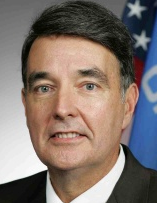Lawmaker on CAAIR's Board Introduced Amendment Exempting It From Regulation
Monday, October 23, 2017 | 0
A Christian drug-rehab program that operated as a work camp for private industry was almost regulated in 2013, but a lawmaker who served on its board intervened just in time with an amendment that kept the program out of state oversight, Reveal News reported.

Doug Cox
The Oklahoma-based Christian Alcoholics & Addicts in Recovery has come under scrutiny after an investigative news report revealed it pocketed participants' workers' compensation benefits, forced them to work long hours in a chicken-processing plant under threat of prison and required them to consume religious dogma, all while providing no rehabilitation services aside from the 12-step program.
Since the story came out, two federal lawsuits have been filed against CAAIR and multiple public and private entities — from the Oklahoma Attorney General’s Office to the American Civil Liberties Union of Arkansas to the Arkansas Workers’ Compensation Commission — have confirmed investigations into the program.
Reveal published another story naming several other rehab programs in the central United States that “supply cheap and captive workers to major poultry companies,” including Tyson Foods and Simmons Foods. The rehab organizations are the Drug and Alcohol Recovery Program, The People’s Network, Northeastern Oklahoma Council on Alcoholism, and Freedom from Addiction Through Christ.
“These are for-profit forced labor camps masquerading as rehabilitation programs,” Rita Sklar, the ACLU of Arkansas’ executive director, told WorkCompCentral for an Oct. 12 story. “Those responsible for this unlawful slave labor scheme should be held accountable.”
Such programs came into the spotlight in 2013 after a handful of patients died in an unregulated, Church of Scientology-backed rehab called Narconon Arrowhead. Oklahoma lawmakers introduced a bill that year that would place these programs under state oversight.
Then Republican lawmaker Doug Cox stepped in, Reveal News reports.
“He said, ‘Look, I have a couple of them in my area. Would you mind exempting them?’” former Republican Rep. David Derby, who sponsored the bill, recalled to Reveal.
What Cox didn’t tell Derby was that he served on CAAIR’s board of directors. Derby said he “wouldn’t have done it” if he had known.
Another cosponsor, Republican Rep. Jason Murphey, said he didn’t know, either: “Are you serious? That’s crazy.”
Cox’s amendment exempted “residential recovery and recovery support programs that are not collocated with certified treatment programs” from the provisions of the Oklahoma Alcohol and Drug Abuse Services Act. It also defanged a provision that would have revoked certification for rehab programs that didn’t play by the rules (though that provision wouldn’t have applied to CAAIR because it is not certified).
The Oklahoma Constitution requires lawmakers with any “personal or private interest” in a bill to disclose that interest to other lawmakers. Cox did not do so during the committee hearing for the amendment or during recorded discussions on the House floor.
He also did not mention it in an editorial for a local newspaper trumpeting the amendment, which ultimately passed.
“I was able to amend the bill in a manner that would still give some oversight to the program that had the issues, but would not interfere with the others that are doing a good job,” Cox wrote, according to Reveal.
The former lawmaker, who reached his term limit in 2016, told Nomin Ujiyediin of the Oklahoma City public radio station KGOU-FM that his position on CAAIR’s board wasn’t a conflict of interest.
“That would be like saying I couldn’t vote on anything to do with Medicaid because I’m a physician that sees Medicaid patients,” Cox said on Wednesday.
WorkCompCentral has published several stories on CAAIR's alleged pocketing of participants' workers' compensation benefits. The program required participants — who were sent to CAAIR from drug courts in Oklahoma, Texas, Missouri and Arkansas — to sign a form stating they were not employees but "clients" of CAAIR and thus ineligible for workers' compensation benefits.
But CAAIR applied for workers' compensation benefits for at least a handful of men and pocketed the payments, Reveal reported.
Philip Hood, commissioner of the Arkansas Workers' Compensation Commission, said that's insurance fraud. The commission's CEO confirmed to WorkCompCentral that the panel has looked into CAAIR and intends to share its findings with state agencies that can launch an official investigation.
Michael Duff, a law professor at the University of Wyoming who authored a textbook on workers' compensation law, mentioned CAAIR during his keynote speech on the erosion of the grand bargain at the Workers' Injury Law Group's annual convention.
Pointing out the fact that CAAIR told participants that they were not eligible for workers' comp, Duff asked, "If work is so much safer and better — why is the system trying so hard to completely extinguish claims?"





Comments